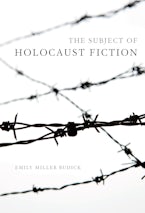- Home
- Jewish Literature and Culture
- The Subject of Holocaust Fiction
Preparing your PDF for download...
There was a problem with your download, please contact the server administrator.
The Subject of Holocaust Fiction
Published by: Indiana University Press
266 Pages
- eBook
- 9780253016324
- Published: May 2015
$9.99
Other Retailers:
Fictional representations of horrific events run the risk of undercutting efforts to verify historical knowledge and may heighten our ability to respond intellectually and ethically to human experiences of devastation. In this captivating study of the epistemological, psychological, and ethical issues underlying Holocaust fiction, Emily Miller Budick examines the subjective experiences of fantasy, projection, and repression manifested in Holocaust fiction and in the reader's encounter with it. Considering works by Cynthia Ozick, Art Spiegelman, Aharon Appelfeld, Michael Chabon, and others, Budick investigates how the reading subject makes sense of these fictionalized presentations of memory and trauma, victims and victimizers.
Introduction
Prologue: Ghostwriting the Holocaust: The Ghost Writer, The Diary, The Kindly Ones, and Me
Section One: Psychoanalytic Listening and Fictions of the Holocaust
1. Voyeurism, Complicated Mourning, and the Fetish: Cynthia Ozick's The Shawl
2. Forced Confessions: Subject Position, Framing, and the "Art" of Spiegelman's Maus
3. Aryeh Lev Stollman's Far Euphrates: Re-picturing the Pre-Memory Moment
Section Two: Golems, Ghosts, Idols, and Messiahs: Complicated Mourning and the Inter-textual Construction of a Jewish Symptom
4. Bruno Schulz, the Messiah, and Ghost/writing the Past
5. A Jewish History of Blocked Mourning and Love
6. See Under: Mourning
Section Three: Mourning Becomes the Nations: Styron, Schlink, Sebald
7. Blacks, Jews, and Southerners in William Styron's Sophie's Choice
8. (Re)Reading the Holocaust from a German Point of View: Berhard Schlink's The Reader
9. Mourning and Melancholia in W. G. Sebald's Austerlitz
Epilogue: Holocaust, Apartheid, and the Slaughter of Animals: J. M. Coetzee's Elizabeth Costello and Cora Diamond's "Difficulty of Reality"
Notes
Bibliography
Index
Emily Miller Budick holds the Ann and Joseph Edelman Chair in American Studies at The Hebrew University of Jerusalem, where she is also chair of the Department of English and Director of the Center for Literary Studies. Her major publications include Fiction and Historical Consciousness, Engendering Romance, Blacks and Jews in Literary Conversation, and Aharon Appelfeld's Fiction (IUP, 2004).
"
" ~Studies in Contemporary JewryThe Subject of Holocaust Fiction
is a profoundly challenging work of literary criticism by a brave critic who asks us to look beyond the difficult hard facts of the Holocaust to the complex subjectivities of all those affected by it, a scholar whose final legacy to us is the insistence that the subject of humanities scholarship must ultimately and always be the human.
"E. M. Budick's The Subject of Holocaust Fiction is a timely addition to the steadily growing academic canon on Holocaust fiction. . . As Budick rightly acknowledges, it is . . . self-scrutiny performed both by its writers and by its readers, that makes Holocaust fiction so important and that should ensure its future standing."
~Literature and History
"Budick (Hebrew University of Jerusalem) presents new readings of well-known and understudied but significant texts of Holocaust fiction. . . This is an important contribution to literary studies. . . . Highly recommended.V.47 2016"
~Choice
"[E]xamining the themes of mourning, memory, and love, and considering the relationship of the Holocaust to apartheid and animal slaughter, the author provides a framework for students of literature, history, religion, philosophy, and ethics."
~American Reference Book Annual
"Gathers together almost a dozen essays on key Holocaust writers, from Cynthia Ozick and William Styron (in his role as the author of Sophie's Choice) to W. G. Sebald and Art Spiegelman. 5/11/16"
~Times Literary Supplement
"Emily Miller Budick packs an astonishing number of texts into The Subject of Holocaust Fiction and explores them through a number of lenses. Students and scholars of comparative literatures, Holocaust studies, or trauma and psychology in literature will all find something of interest, and for those familiar with many of the above texts the intertextual reading the author weaves through the book makes it a useful new resource."
~Holocaust Studies
"This volume presents ethical, moral criticism at its best: beautifully written, entirely accessible, profound in its explications of well-known texts that are here given new readings, and comprehensive in its attention to other critics."
~Anita Norich, University of Michigan

